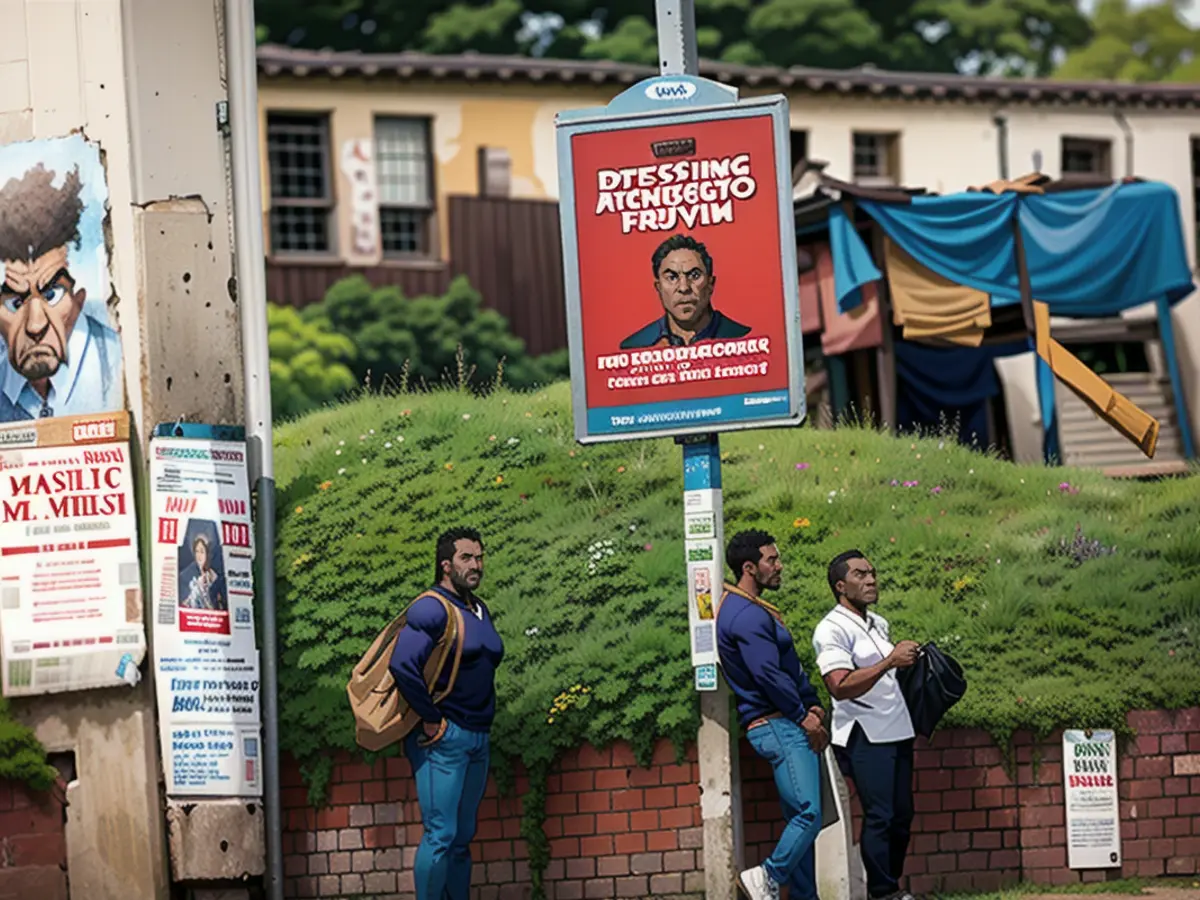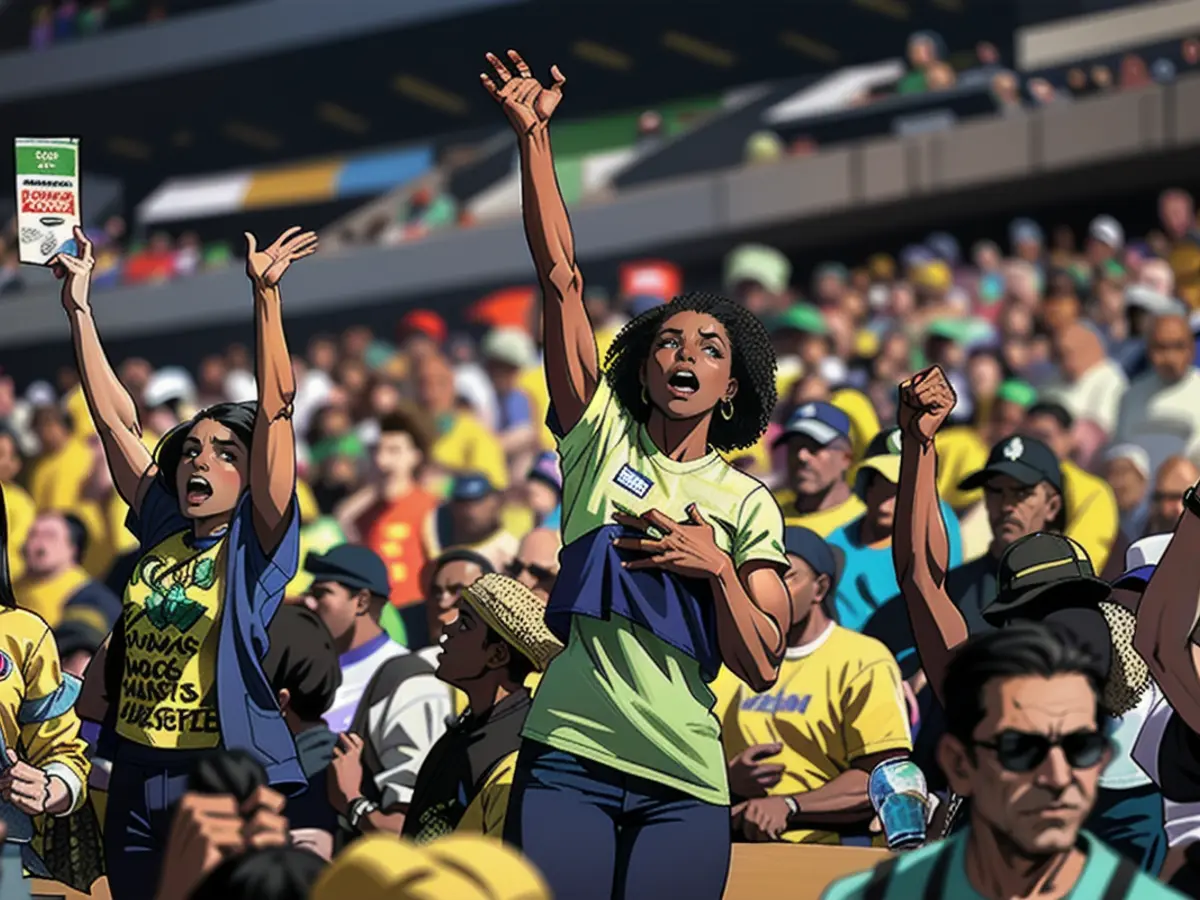South African youth are increasingly disillusioned with democracy.
The majority of young South Africans feel that politics doesn't have any solutions for their problems. Today marks the day of voting in South Africa. But what happens to a democracy when a significant portion of the population simply refuses to participate?
Fentse Malatji organizes her backpack with a laptop, a phone charger, snacks, and a unique card game. Each card has an appealing graphic and a question. Examples include: When was the last time you felt truly happy? What do you aspire for the future? Do you think voting is important?
"Voting or not, that's a controversial subject," Fentse comments as a 25-year-old who works for Youth Capital, an NGO that advocates for young South Africans. She acknowledges that less than half of people between the ages of 20 and 29 have registered to vote in this election. It's uncertain how many of them will actually show up. Five years ago, it was only 30 percent. "Young South Africans crave change, but they don't believe that democracy is the answer," Fentse explains. "They find alternative ways to enhance their lives. Voting is not their top pick."
South Africa is a young democracy in more ways than one. The average age of the population totals 28 years old, making the voice of the young generation highly influential. However, a significant portion of them does not trust that politicians offer solutions to their issues. This is especially true for the major problem of youth unemployment: 30 years after the dismantling of the apartheid system, 70 percent of South Africans under 25 are jobless. The past decade under ANC control has not helped much: the government is riddled with corruption, effectively eroding the state. The majority of the black population lives in extreme poverty. The police struggle against powerful criminal gangs.
"This election is critical," says political analyst and Club of Rome member Morne Mostert. "A great deal of energy is about to be unleashed. South Africa has free and fair elections, a fantastic constitution, media freedom, and a strong judiciary, but these cornerstones of democracy haven't transformed the lives of the majority of South Africans at all." Mostert speaks of a "democratic surplus." While there's more freedom than prosperity, it's impossible to sustain this long-term, especially when politicians lose touch with reality. "Frustration has been building up for a while." Many experts predict violent unrest in South Africa.
Mostert, however, sees the political situation optimistically. "Twenty-eight million South Africans live solely on government assistance, making up 45% of the population," he explains. Yet, "our population is dynamic, young, and full of potential." There's also an increase in literacy rates and the spread of mobile technologies. There are economically growing areas like Cape Town. "These developments signal a possible second wave of democracy, in which South Africa's youth will play a crucial role."
The outcome of the election in South Africa is vital for Germany. "The nation is an economic heavyweight on the African continent," says Gregor Jaecke, head of the Konrad-Adenauer Foundation's Cape Town bureau. "South Africa is Germany's most significant trading partner in Africa, which becomes even more important for Europe and Germany as well." 600 German businesses have locations in South Africa, including major car manufacturers such as Volkswagen. However, foreign policy and this election's significance are far from the concerns of young South Africans. The only exception is the situation in Gaza. Support for the Palestinians is widespread here.
Fentse Malatji and her colleague Sibabalwe Nobandla are now in a taxi. "How should democracy function if so many don't trust it?", asks Sibabalwe. "Then this 30-year experiment would be a failure. I still believe voting is necessary. But we need to find ways to make politics beneficial again." Their phones continuously buzz. They're meeting with like-minded individuals on the University of Cape Town's campus today. It's essential to engage with young voters en masse, record their requirements, and develop concepts and programs, they assert. And, surely, to hold the new government accountable. And, of course, to curb unrest.
31 parties are competing for the 400 seats in South Africa's parliament. Unlike Germany, there's no electoral threshold. The ANC's campaign progressed rather gradually. Their final major event at a soccer stadium in Soweto on Saturday was underwhelming. Only 75,000 seats filled out of 90,000, with participants carried at ANC's expense and given an ANC T-shirt with a slogan. The quality of the T-shirts raised questions in some observers. Although President Cyril Ramaphosa continuously prayed for the ANC to earn more than 50% of the votes on Wednesday, almost all polls point to the opposite.
That wraps up our story. Let's hope for a positive outcome. However, keep in mind the potential for change and the active role of the young generation in shaping South Africa's future.
According to Jaecke, if the ANC relies on a coalition partner, this would be a first in the history of democratic South Africa. A probable coalition partner would be the economically radical "Economic Freedom Fighters," or EFF, led by former chairman Julius Malema. This party mainly consists of frustrated young voters. Malema recently stated, "If the ANC needs us, that's good. We're not too far apart when it comes to the land issue." He advocates for the expropriation of white landowners. A partnership between the ANC and EFF could discourage international investors. Malema has faced several lawsuits for his openly racist remarks about white South Africans.
Jaecke adds, "If the ANC shifts toward the political center and, for instance, teams up with the most significant opposition party, the Democratic Alliance, or the well-established Freedom Party in the province of Natal, I'd expect a foreign policy that's more aligned with the West compared to a left or left-leaning government."
Forming coalitions is a precarious endeavor when political obstinacy reigns supreme. Coalitions, on a regional and provincial level, have only lasted briefly in South Africa. Large parts of the nation are currently ungovernable. Infrastructure is deteriorating, violent protests among young people are the norm. Furthermore, the number of political assassinations is growing alongside inconclusive election outcomes. This is particularly evident in Kwazulu Natal, where the disgraced former president Jacob Zuma intended to run with his newly formed party MK. Shortly before the election, the Constitutional Court ruled that he was ineligible to be an MP due to his criminal conviction. The MK then declared they would still participate in the election and ensure that Zuma becomes president. Contempt for democratic processes is now prevalent in many political parties.
In front of the library on the university campus, Fentse has laid out a card game. "This is our tool," she explains. "Let's shuffle, draw a card, and the conversation begins." The randomness determines the topic, while reality influences the overall outcome. "I don't decide what to choose," says the first student. "So many parties. I don't trust their promises," comments the second. These students discuss their parents' debts, which they must repay as children, rising gas and housing prices, and the slim possibility of finding employment. Fentse records these discussions on her smartphone.

Read also:
- Year of climate records: extreme is the new normal
- Precautionary arrests show Islamist terror threat
- UN vote urges Israel to ceasefire
- SPD rules out budget resolution before the end of the year
Despite the ANC's campaign struggles and low turnout among young voters, Fentse Malatji still believes in the importance of voting. She acknowledges that less than half of South Africans between 20 and 29 have registered to vote for this election, but she highlights the need to engage with young voters, record their requirements, and hold the new government accountable.
The disillusionment among South African youth towards democracy is evident, and this is a major concern for the African National Congress (ANC), as young South Africans often vote for opposition parties like the Economic Freedom Fighters. This coalition could potentially see the ANC ally with a radical left-wing party that advocates for the expropriation of white landowners, which could deter international investors.
Source: www.ntv.de








